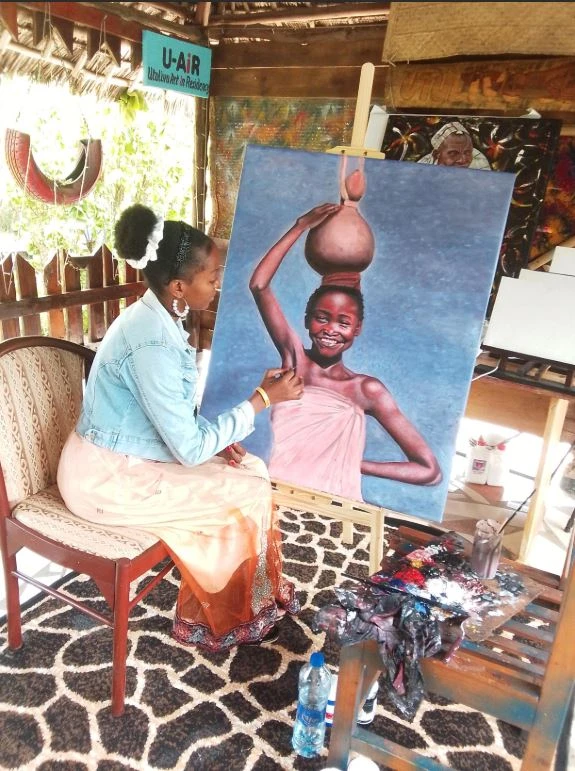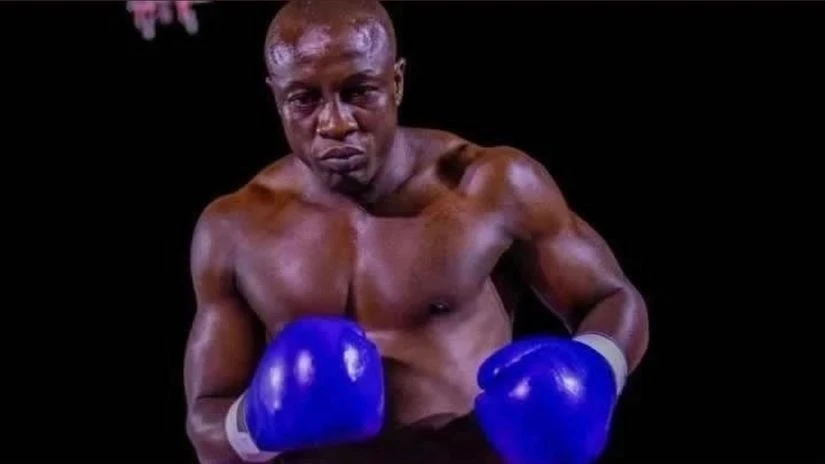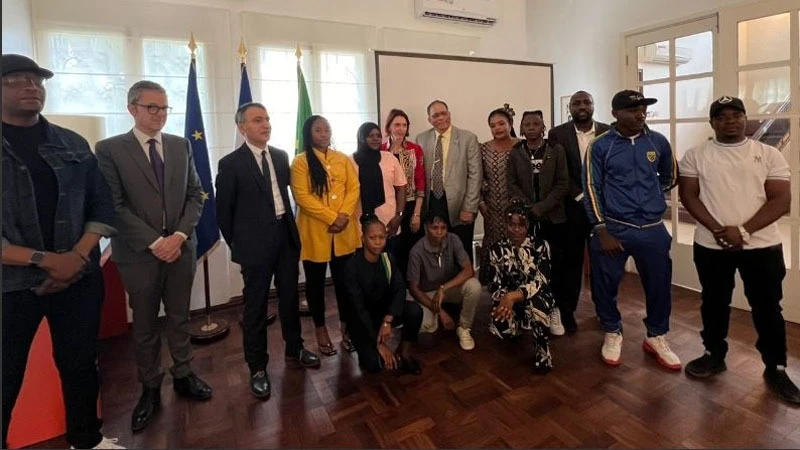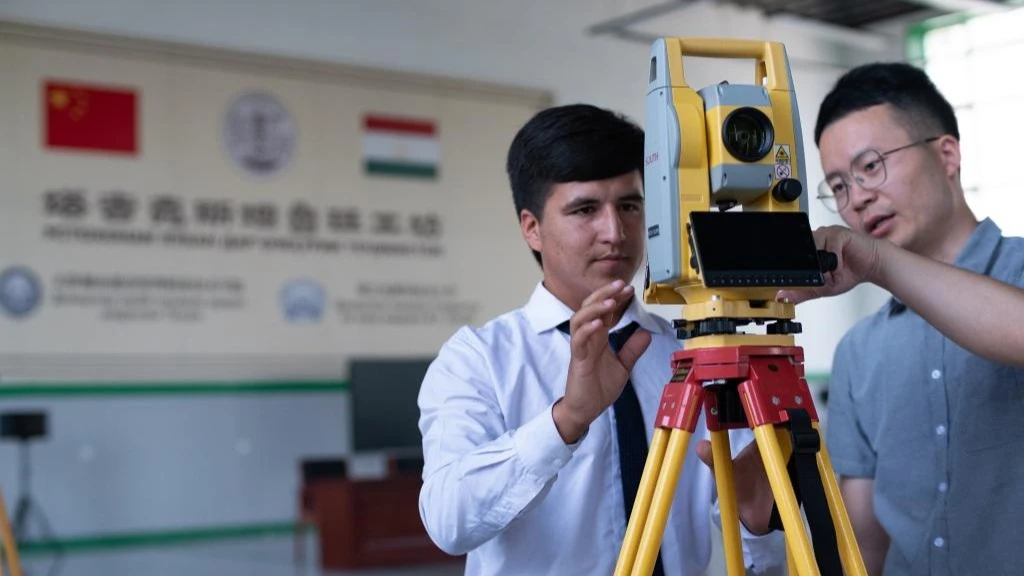Art residency injects fresh perspective into Tanzania's arts promotion

CARVING a niche in visual arts has always been a feat that Suzanna Edward wishes to achieve in her life.
From the time the Zanzibar-born, 26-year-old artist found that visual art is not only her biggest passion but also something she could turn into a reliable source of livelihood, Suzanna has been eager to learn and perfect her skills so she could become an accomplished visual artist.
Suzanna's wish to successfully launch her quest for a tremendous career in visual arts came to reality after she won the Emerson Zanzibar Foundation Visual Arts Award 2024.
Emerson Zanzibar Foundation coordinated the event with Dar es Salaam's contemporary arts centre, Urithi Arts.
The promising visual artist was consequently presented with an opportunity to attend a one-month art residency program at the APAO Village, located at Mbutu Kichangani, in Kigamboni, Dar es Salaam.
The Emerson Zanzibar Foundation Visual Arts Award 2024 winner, per the foundation's consultant Dismas Sekibaha, was given a chance to be an artist-in-residence at the scenic Dar es Salaam retreat from May 10 to June 10.
An overjoyed, yet soft-spoken Suzanna, in an interview held during her open studio, appreciated having secured the art residency platform, saying it will go a long way in bolstering her creativity.
She said the art residency opportunity is, to her, a platform for learning how to come up with various creative, compelling artworks.
"I have come here to learn various aspects of visual arts, how to create various artworks, gain more knowledge and see to it that my works have a great appeal," Suzanna, whose preferred medium is acrylic, stated.
The artist, who started her career in 2019, acknowledged that the APAO Village offered her wonderful, serene surroundings which could help her fully explore her creativity.
"I'm getting an opportunity to create artworks without the supervision of an instructor. It's quite different from the approach I go for when working in Zanzibar, whereby, I normally work under the supervision of an instructor," Suzanna noted.
"When working in the Isles, I may, for instance, come up with an idea for an artwork, do sketches under the supervision of my instructor who, later on, does the final touches," she said.
"Having arrived here, however, I'm doing everything alone. I hardly believed I could individually create an artwork, which could ultimately be quite attractive. I have tried my best, and I have done it all alone," Suzanna stated.
The artist said: "I have placed measurements and created artworks without anyone's supervision; no instructor has played a part in these works, and this is exactly what I have gained here."
She was adamant that she had so far not encountered shortcomings in the art residency program.
Suzanna is, further, appreciative of triumphing in the Emerson Zanzibar Foundation Visual Arts Award 2024, stating she has consequently landed a lifetime platform for developing her talent.
"It would have been difficult for me to be in this environment to learn and sharpen my skills if I had not won the award," she disclosed.
Suzanna turns out to be a talented visual artist whose creativity can easily win the admiration of art enthusiasts.
Her creativity is substantiated by two great pieces of artwork she created within the first few days of the program, both of which were created on canvases.
There is an artwork showcasing a brimming young lady carrying a water pot, and the other piece is a moving portrait of a mother confidently carrying her child in her arms.
The budding visual artist is, in essence, a beneficiary of an exciting endeavour by Urithi Arts, which gears towards galvanising efforts to successfully develop the genre domestically.
Fred Halla, the Urithi Arts founder, whose centre dwells in creating visual arts and public arts, pointed out that Joel Bwemelo, an art enthusiast, set up the APAO Village to, among others, serve as a platform for developing Tanzania's arts.
"Although Bwemelo is a medical doctor, he is a great enthusiast of the arts. He set up this retreat for various activities including performing arts and visual arts. He aimed to help talented artists use the retreat to secure an income," Halla revealed.
"Though he, later on, turned APAO Village into a business entity, he felt he possessed a strong calling for promoting the arts. I, for that matter, sought his input in the formation of the art residency program at the retreat," he noted.
"I decided to involve Sekibaha in the plan to form the art residency. The two of us had several meetings, looking into the matter, and were later informed that there is a space for the program," he pointed out.
"We were asked to prepare a program for bringing in artists for the art residency, which could ultimately be beneficial to artists and the retreat's owner," Halla said.
"APAO Village's owner, Bwemelo, wanted to see to it that the place does not merely serve as a destination offering relaxation; it should further give the customers added motivation in the form of being exposed to artistic activities," the seasoned artist stated.
"A visitor should not just come to APAO Village to merely access better accommodation for his/her relaxation, he/she should further be enticed to visit the retreat to enjoy compelling works of art created by talented domestic artists," Halla noted.
"A person in Mtwara may, for instance, have a trip to Zanzibar and Arusha. He/she may be prompted to visit APAO Village in Dar es Salaam for a couple of days of relaxation and immersion in an art exhibition and, later on, take a boat trip to Zanzibar and then take a flight to Arusha," he pointed out.
"Someone may, for that matter, feel the urge to come to APAO Village because there are interesting artistic activities," he said.
Halla revealed it has not been easy for them to get the art residency program underway, noting there have been several setbacks.
"Art residency program, normally, does not carry many artists. It might have either one or two artists. At some point, it will host a group of artists," the artist noted.
According to Halla, the art residency program presents artists with an opportunity to work far from their respective workplaces so they can get time to relax and improve their creativity.
It is, he added, a quiet place that gives artists freedom to think and come up with unique artworks, which could hardly be compared to the works they created early on.
He was adamant that it was all geared towards bringing about changes in how visual artists go about their work.
Sekibaha noted that the Emerson Zanzibar Foundation Visual Arts Award is a brainchild of the Emerson Zanzibar Foundation.
Emerson Zanzibar Foundation, per the consultant, was co-founded in 2014 by an American hotelier Emerson Skeens.
Skeens, who passed away the same year, was a pioneer of boutique hotels in Zanzibar. He was a Zanzibar resident for 25 years and was renowned for founding and supporting a wide variety of creative innovations.
Emerson Zanzibar Foundation, as stated by Sekibaha, has been hosting awards to honour budding practitioners in art genres of music, film and visual arts.
It has created film, music and visual arts awards to inspire and promote Zanzibar artists, who are pursuing their artistic vision in the Isles.
He said Skeens felt that Zanzibar is a unique place therefore there was a need for setting up a platform for promoting arts in such aspects as film, music, visual arts, and architecture.
"He has (much as he has passed away) continued to support arts promotion via his institution's purchase of works of art created by the Isles' artists. The works include collections by Msagula, George Lilanga, Mzuguno, and many more artists," Sekibaha pointed out.
According to him, Emerson Zanzibar Foundation has three main programs- music awards (in February), film awards (in June during the Zanzibar International Film Festival), and visual awards (in December).
"For many years, the awards' winners were presented with cash prizes and, when I came in as a consultant, they had a different view, thus, they opted to, instead of handing over cash prizes, accord winners opportunities for engaging in development programs," he revealed.
"Winners of the music awards have, this year, secured music recording sponsorship and we will then help them launch their album. We only aim at helping them develop," he said.
Sekibaha revealed the Emerson Zanzibar Foundation Visual Arts Award has, since its inception, been open to visual artists of both sexes but, from the end of last year, the foundation's officials felt it should exclusively be for female artists.
"Sixteen artists applied for participation in last year's Emerson Zanzibar Foundation Visual Arts Award. The group included an artist from Pemba whose works, however, did not meet the required standards," Sekibaha noted.
He added: "It was not about empowering (visual artists) without skills, it was more of empowering (visual artists) with skills."
The consultant disclosed that the award organisers were, as a result, left with 15 contenders who submitted about 58 works, with Suzanna submitting three works.
"We did an exhibition on December 9, last year, and from December 10-12, we had six juries evaluating the works. Two of them are seasoned arts instructors, one is a veteran artist based in the United Kingdom (UK), Othman, a UK arts instructor, Nicklas and Sarah, who owns an art residency initiative in Barcelona, Spain," he stated.
Sekibaha pointed out that the juries, eventually, got the winner, Suzanna, and, since the award organisers had found a different way to honour the winner, Halla came up with the art residency program at APAO Village, which proved to be a befitting way of honouring Suzanna.
"With the Emerson Zanzibar Foundation Visual Arts Award organisers having already planned that the winner would get a unique prize, which hardly constitutes cash, I advised the foundation's board members that the winner should have an opportunity for the art residency program," Sekibaha said.
"The most important aspect of it all is that Suzanna must get exposure... I advised the board that she should get out of Zanzibar, she should come here (at APAO Village, Kigamboni) and get down to work in a serene atmosphere," he noted.
The consultant revealed that the art residency program gears towards influencing changes in how Suzanna and fellow visual artists, set to secure the chance in future, go about their work.
"The changes do not necessarily happen once she embarks on the art residency; she may stay here for a month and, when she goes back to Zanzibar, she would have a completely different approach to the creation of works of art...that is the main objective," he noted.
Sekibaha maintains that the art residency is a local initiative, which is independently organised in such a way that the three institutions which have joined forces to take charge of the program efficiently champion the development of visual artists.
"Emerson Zanzibar Foundation solicits funds from the local network, Urithi Arts also looks for funds to develop the program and APAO Village's owner offers a platform for carrying out the program," he noted.
He was adamant that if more stakeholders came in and funded art residencies in other parts of the country, the initiative would be guaranteed sustainability.
He said: "After Suzanna's art residency program, there will be an art residency for another artist...it has to be paid for and, if the artist does not have funds, efforts will be made to access funds for facilitating the program."
Sekibaha, moreover, foresees a vibrant visual art scene and blossoming art residence programs in Tanzania in the coming years, should there be better coordination between art institutions and the genre's enthusiasts.
Suzanna, as it turned out, looks to be a perfect beneficiary for the inaugural Urithi Arts residency program, based on her determination to eventually emerge as an accomplished visual artist.
"I went for training at an institution at Forodhani, Zanzibar and was, thereafter, hardly contented with simply staying at home... I kept on looking for opportunities to improve my career," the artist noted.
She advised fellow female artists that they should not be discouraged by challenges, insisting they ought to keep on looking for chances to improve their skills and come up with great pieces of artwork.
"Some of my fellow artists have, after the training, chosen to simply sit back in their homes, whereas others have abandoned the profession for other activities. I have, however, chosen to be resilient, look for opportunities to improve my career and God has helped me secure the art residency program," Suzanna revealed.
The Urithi Arts residency program, all in all, happens to be a crucial component of Suzanna and fellow domestic visual artists' efforts to turn around their fortunes.
The program is all out to see to it that the visual artists scale great heights in their beloved field, as they sharpen their creativity whilst being assured of financial stability.
Top Headlines
© 2025 IPPMEDIA.COM. ALL RIGHTS RESERVED
























